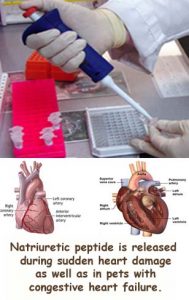Ron Hines DVM PhD
Your Pet’s ProBNP Test aka Cardio-BNP Test, NT-proBNP, B-type natriuretic peptide
There are times when it is quite evident to your veterinarian that something is wrong with your pet’s heart. But there are other times when the vet’s physical exam, x-rays, ultrasound and EKG examination are inconclusive.
When that occurs your vet will be uncertain if your pet’s chronic cough, labored breathing, weakness or other worrisome symptoms are due to a heart problem, a less serious throat and windpipe irritation, a lung problem or, perhaps, anemia. In those cases, the proBNP test can be very helpful.
The proBNP test is particularly helpful in cats because felines often show their owners no obvious signs or only vague signs even when their heart disease is quite advanced. Deciding if the heart of a toy breed of dog is slightly enlarged can be exasperating for veterinarians as well. Those toy breeds are the same breeds that commonly have narrow or collapsed windpipes that can also give rise to coughs. The proBNP test can be quite helpful in separating one cause from the other. It might also be a wise periodic test for pets that have heart disease in their family tree or before being considered as potential breeders.
In interpreting your pet’s proBNP test results, one has to remember that some dogs breeds with normal hearts have higher proBNP readings than other breeds. Labrador retrievers and Newfoundlands, for example, have normally high readings while those in normal dachshunds are much lower. I do not know if similar things occur in cats.
In humans, gum infection/periodontal disease/tartar is also known to raise ProBNP levels. (read here) We do not know if the same is true in dogs or cats, but it is certainly reason enough to treat dental issues in your pet. Since heart disease and dental disease can coexist, general anesthesia for such procedures is problematic and not without risk.
The proBNP test (N-terminal pro-brain natriuretic peptide = NT-proBNP) has been used to access human heart disease since 1994. It examines the amount of a biomarker (peptide pro-hormone) which increases in amount in the blood stream when the pet’s heart has been damaged. Since its structure differs slightly between dogs and cats, tests designed for one cannot be used in the other.
The test is a good economical first-choice screening test; but your pet’s proBNP results need to be verified in other ways when they are abnormal. It is also an excellent way to verify that the health exam that gave suspicious results for heart disease in your pet was accurate before beginning treatment or before scheduling a consult with a veterinary cardiologist.
The test might also be valuable in deciding when and if a heart murmur in your pet need medical treatment. Along with other test results, a puppy or kitten’s proBNP level might be useful in deciding the probability of surgical success when one contemplates that option for a dog or cat born with a heart defect. The chances for success are less when the test results indicate that extensive heart damage has already occurred (read here).
Blood samples for the test must be submitted in refrigerated gray or pink top tubes (those color tubes contain proteinase inhibitors). Those tubes should be fresh (< 6-month-old). High blood BUN levels in your dog and cat can affect the results, as can improperly handled specimens.
The two largest US labs measure slightly different portions (fragments) of the BNP molecule – so their results will not be the same. Once dogs and cats are taking heart medications, their BNP levels are apt to be lower or false-negative.
Also remember, the BNP test is not a stand-alone test. A high test result is only a preliminary screening clue that your pet might have a heart issue. As I mentioned earlier, anything that puts strain on your pet’s heart can cause its blood pro-BNP level to rise. That includes the lung issues I mentioned earlier, high blood pressure (pulmonary hypertension or systemic hypertension), hyperthyroidism, kidney failure, infection and even autoimmune disease.
Complementary Tests:
Chest x-rays, EKG, cardiac ultrasound, echocardiogram, CBC/ WBC and blood chemistry values, cTn1 test test run at Texas A&M veterinary school
DxMe
